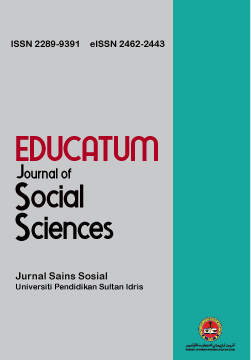Construction of Enhanced Recovery Training Module for Former Drug Addicts
DOI:
https://doi.org/10.37134/ejoss.vol8.1.9.2022Keywords:
Module Validity, Module Reliability, Enhanced Recovery Training Module, PUSAbstract
Construction of an academic module requires few main objectives in the module construction which are Module Construction, Module Validity Assessment, Module Reliability Test, and Module Effectiveness on the Studied Variables Test. However, in this research, the researcher focuses on Module Construction, Module Validity and Module Reliability. In this research, Enhanced Recovery Training Module (ERTM) is implied to former drug addicts which refers to person under surveillance (PUS) as an extended training after being released from the rehabilitation center. PUS is those who has completed their treatment and rehabilitation program under Section 6(1)(a) [Magistrate's order to drug addicts to undergo treatment and rehabilitation at PUSPEN for a period of not more than 2 years and after that undergo supervision in the community for not less than 2 years]. The construction of activities in this module is based on the al-Ghazali counselling theory. The module construction in this research uses Sidek Module Construction Model and uses the descriptive research design to evaluate the validity of the module and to test the reliability of the module. To assess the validity of the module content, a total of nine experts in related fields have made a recommendation. Meanwhile, to assess the reliability, it involves 20 samples who had undergone a pilot test of the ERTM module and had answered the module reliability questionnaire. The findings show that Enhanced Recovery Training Module has achieved a high percentage of validity which is 90.3 percent and the high index value of content validity at 0.9. While the module reliability test using the Cronbach Alpha reliability coefficient is high which is .902. Therefore, this module is also able to provide new contributions to PUS as a follow-up training to help this target group continue to recover from addiction to illicit substances. It is hoped that the use of this module can also help reduce the risk of recurring addiction to the target group.
Downloads
References
Abu Bakar Nordin. (1995). Penilaian Afektif. Kajang: Masa Enterprise.
Agensi Antidadah Kebangsaan. (2020). Maklumat Dadah 2020. Kuala Lumpur: AADK, Kementerian Keselamatan Dalam Negeri
Creswell, J. W. (2005). Educational research: Planning conducting and evaluating quantitative and qualitative research. New Jersey: Pearson Education Inc.
Haider, S. H., Asad, M., & Aziz, A. (2015). A survey on the determinants of entrepreneurial training effectiveness among micro finance institutions of Malaysia. Mediterranean Journal of Social Sciences, 6(6 S4), 396-403. doi:10.5901/mjss.2015.v6n6s4p396
Haider, S. H., Asad, M., Fatima, M., & Abidin, R. Z. (2017). Microfinance and performance of micro and small enterprises: Does training have an impact. Journal of Entrepreneurship and Business Innovation, 4(1), 1-13. doi:https://doi.org/10.5296/jebi.v4i1.10566.
Haq, M. A., Asad, M., Natarajan, V., Sankar, J. P., & Asif, M. U. (2021). 2020 Microfinance and empowerment: A case study on benificiaries of a community development program. Turkish Journal of Computer and Mathematics Education, 12(10), 5409-5415.
Israr, A., Asad, M., Altaf, N., & Victor, S. (2021). Training effectiveness and performance of micro small and medium sized enterprises. Turkish Journal of Computer and Mathematics Education, 12(10), 5409-5415.
Jamaludin Ahmad & Sidek Noah. ( 2001). Pendekatan Alternatif Menentukan Kesahan dan Kebolehpercayaan Modul Program Maju Diri. Jabatan Pendidikan Selangor.Jurnal PERKAMA 9: 97-118.
Jamaludin Ahmad. (2011). Modul Motivasi Diri. Penerbit: Dewan Bahasa Pustaka.
Kashif, M., Asif, M. U., Ali, A., Asad, M., Chethiyar, S. D., & Vedamanikam, M. (2020). Managing and implementing change successfully with respect to COVID-19: A way forward. PEOPLE: International Journal of Social Sciences, 6(2), 609-624. doi:org/10.20319/pijss.2020.62.609624.
Mohamad Isa Amat, Muhammad Khairi Mahyuddin, Khairunneezam Mohd Noor, Mohd Rushdan Mohd Jailani, Mohd Zohdi Mohd Amin, Roslee Ahmad, Ku Suhaila Ku Johari &, & Nurfarhah Mohd Najib. (2016). Penilaian Modul Latihan 7 Langkah Kepulihan dalam Penagihan (7 Steps Recovery in Addiction Modul : 7-SRA) Ke atas Komuniti Aftercare : Aspek Kesahan dan Kebolehpercayaan. ACREDA,Fakulti Kepimpinan Dan Pengurusan Universiti Sains Islam Malaysia, 1–15.
Mohd Izwan Md Yusof & Saiful Azhar Saadon. (2015). Peranan Jabatan Kemajuan Islam Malaysia (JAKIM) Dalam Menangani Isu Penagihan Dadah Melalui Intervensi Kerohanian: Kajian Pelaksanaan Program 2011-2015. Jurnal AADK 2015.
Mohd Majid Konting. (1998). Kaedah penyelidikan Pendidikan (Edisi ke-4). Kuala Lumpur: Dewan Bahasa dan Pustaka.
Mohd Majid Konting. (2009). Kaedah Penyelidikan Pendidikan, Edisi ke 8.. Kuala Lumpur. Dewan bahasa dan Pustaka
Mohd Nasir Masroom (2016). Aplikasi Modul Terapi Jiwa Dalam Kalangan Pesakit Mental Dan Faedahnya Terhadap Kesihatan Jiwa. Tesis Doktor Falsafah yang tidak diterbitkan. Skudai: Universiti Teknologi Malaysia.
Mohd Zaharen Md Zahir, Md Noor Saper & Mohammad Nasir Bistamam. (2019). Kesahan dan Kebolehpercayaan Modul Kelompok Bimbingan Integrasi REBT-Tazkiyah An-Nafs. Universiti Pendidikan Sultan Idris, Tanjong Malim, Perak.
Mohd. Majid Konting. (2004). Kaedah penyelidikan pendidikan. Kuala Lumpur: Dewan Bahasa dan Pustaka.
Nor Ezdianie Omar & Mohd Tajudin Ninggal. (2019). Teori Kaunseling Psiko-Spiritual AlGhazali: Suatu Pendekatan Alternatif dalam Intervensi Kaunseling. GJAT | December 2019 | VOL 9 ISSUE 3 | 69 ISSN : 2232-0474 | E-ISSN : 2232-0482.
Othman Mohamed. (2000). Prinsip Psikoterapi dan Pengurusan dalam Kaunseling. Serdang: Universiti Putra Malaysia.
Raiya.H.A & Kenneth I (2011). Pargament. “Empirically Based Psychology of Islam: Summary and Critique of the Literature.” Mental Health, Religion and Culture 14: 93–115.
Rosni Wazir, Abur Hamdi Usman, Norsaleha Saleh, Suriani Sudi, Abdul Hadi Awang, Syamim & Zakwan Rosman (2019). Tuntutan Pencegahan Dadah Menurut Maqasid Sunnah. e-Prosiding Persidangan Antarabangsa Sains Sosial dan Kemanusiaan.
Russell, J.D. (1974). Modular instruction. A guide to the design, selection,utilization and evaluation of modular materials. New York: Burgess Publishing Company.
Salasiah Hanin Hamjah. (2016). Pendekatan Kaunseling Spiritual Menurut Al-Ghazali. Penerbit: Dewan Bahasa Pustaka.
Sidek Mohd Noah & Jamaludin Ahmad. (2005). Pembinaan modul: Bagaimana membina modul Latihan dan Modul Akademik. Serdang: Penerbit Universiti Putra Malaysia
Yatimah Sarmani dan Mohd Tajudin Ninggal. (2008). Teori Kaunseling al-Ghazali. Mengenal Ilmu, Sejarah dan Kandungan Al-Quran. Penerbit: PTS Islamika Sdn. Bhd.





